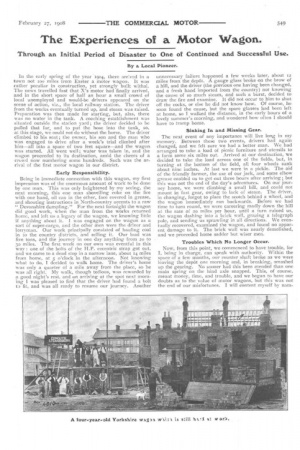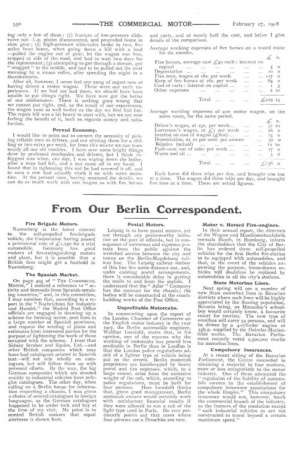The Experiences of a Motor Wagon.
Page 5

Page 6

If you've noticed an error in this article please click here to report it so we can fix it.
Through an Initial Period of Disaster to One of Continued and Successful Use.
By a Local Pioneer.
In the early spring of the year 1904, there arrived in a town not loo miles from Exeter a motor wagon. It was rather peculiar in construction, yet strongly built withal. The news travelled fast that X's motor had finally arrived, and in the short space of half an hour a small crowd of local unemployed and would-be drivers appeared on the scene of action, viz., the local railway station. The driver from the works eventually turned up, and steam was raised. Preparation was then made for starting, but, alas, there was no water in the tank. A coaching establishment was situated outside the station yard ; the driver decided to be pulled that far, and to put the hose into the tank, so, at this stage, we could not do without the horse. The driver climbed to his seat; the owner, his son and the man who was engaged to drive after a week's trial climbed after him—all into a space of two feet square—and the wagon was started. All went well; water was taken in, and the wagon proceeded to its destination, amid the cheers of a crowd now numbering some hundreds. Such was the arrival of the first motor wagon in our district.
Early Responsibility.
Being in immediate connection with this wagon, my first impression was of the enormous amount of work to be done by one man. This was only heightened by my seeing, the next morning, this one man shovelling coke on the fire with one hand, oil can in the other, face covered in grease, and shouting instructions in North-country accents to a raw
Devonshire dumpling." For the next fortnight the wagon did good work, when the man from the works returned home, and left us a legacy of the wagon, we knowing little if anything about it. I was engaged on the wagon as a sort of super-cargo, and the other men were the driver and lorryman. Our work principally consisted of hauling coal in to the country districts, and selling it. Our load was live tons, and the journey in one day anything from 20 to 30 miles. The first week on our own was eventful in this way : one of the bolts of the H.P. eccentric strap got out, and we came to a dead stop in a narrow lane, about 14 miles from home, at s o'clock in the afternoon. Not knowing what to do, I decided to walk home. The driver's home was only a quarter of a mile away from the place, so he was all right. My walk, though tedious, was rewarded by a good night's rest, and on arriving at the spot next morning I was pleased to find that the driver had found a bolt to fit, and was all ready to resume our journey. Another unnecessary failure happened a few weeks later, about 12 miles from the depot. A gauge glass broke on the brow of a hill, and the driver (the previous one having been changed, and a fresh hand imported from the country) not knowing the cause of so much steam, and such a burst, decided to draw the fire and examine. It did not occur to him to shut off the cocks, or else he did not know how. Of course, he soon found the cause, but the spare glasses had been left at home, so I walked the distance, in the early hours of a lovely summer's morning, and wondered how often I should have to tramp home.
Sinking In and Missing Gear.
The next event of any importance will live long in my memory. Between these two events, drivers had again changed, and we felt sure we had a better man. We had arranged to take a load of picnic furniture and utensils to a farm some six miles out. Arrived at our destination, we decided to take the load across one of the fields, but, in turning at the bottom of the field, all four wheels sunk about nine inches. At last we were in a pickle. The aid of the friendly farrher, the use of our jack, and some elbow grease enabled us to get out three hours after arriving; but this was not the end of the day's adventures. On our journey home, we were climbing a small hill, and could not mount in fast gear, owing to lack of steam. The driver, in changing, forgot to place the scotch behind a wheel, and the wagon immediately ran backwards. Before we had time to turn round, we were careering madly down the hill at the rate of 20 miles per hour, until a turn ruined us, the wagon dashing into a brick wall, grazing a telegraph pole, and sending us sprawling in all directions. We eventually recovered, examined the wagon, and found no apparent damage to it. The brick wall was nearly demolished, and we proceeded home sadder but wiser men.
Troubles Which No Longer Occur.
Now, from this point, we commenced to have .trouble, for I, being in charge, can speak with authority. Within the space of a few months, our counter shaft broke as we were leaving the depOt one morning and in breaking, smashed up the gearing. No sooner had this been mended than one main spring on the hind axle snapped. This, of course, meant money, time, and trouble, and we began to have our doubts as to the value of motor wagons, but this was not the end of our misfortunes. I will content myself by nam
ing only a few of these : (1) fracture of low-pressure slidevalve rod—l.-p, piston disconnected, and proceeded home in slow gear ; (2) high-pressure slide-valve broke in two, five miles from home, when going down a hill with a load —pulled the engine out of gear, let the wagon run free, stopped at side of the road, and had to wait two days for the replacement ; (3) attempting to get through a stream, got " stogged " in the middle, and had to be pulled out the next morning by a steam roller, after spending the night in a thunderstorm.
After all, however, I never feel any pang of regret now at having driven a motor wagon. These were our early experiences. If we had not had them, we should have been unable to put things right, We have now got the better of our misfortunes. There is nothing goes wrong that we cannot put right, and, as the result of our experiences, the wagon runs as well to-day as the day we first had her. The repair bill was a bit heavy to start with, but we are now feeling the benefit of it, both as regards money and satisfaction.
Proved Economy.
I would like to point out to owners the necessity of picking reliable men as drivers, and not stinting them for a shilling or two extra per week, for from this source we can trace nearly all our old troubles. I have seen some bright things done by professed mechanics and drivers, but I think the biggest was when, one day, I was wiping down the boiler, after a man had left, and a nut came off in my hand. I found that in tightening this nut he had screwed it off, and to save a row had actually stuck it on with some seccotine. At the present time, having mastered the details, we can do as much week with one wagon as with five horses
and carts, and at nearly half the cost, and below I give details of the comparison.
Average working expenses of five horses on a tested route for six months.
Five horses, average cost 4.-40 each : interest on
capital ... ... ... ... 5 Depreciation ... ... ... ... to 0 Five men, wages at 18s. per week 117 0 Keep of five horses at 16s. per week 84 0 Cost of carts : interest on capital ... 5 Other expenses 2 10
Total ... £219 15
Average working expenses of one motor wagon, on the same route, for the same period. Driver's wages, at ass. per week... Lorryman's wages, at Li per week Interest on cost of wagon (Z600) 32 10 26 0 Ti 0
Depreciation, at so per cent. per annum 30 0
Repairs (actual) ... 12 TO
Fuel—one ton of coke per week ... 17 0
• • •
Waste and oil ... 30
Total ... ,1:r36 o
Each horse did three trips per clay, and brought one ton at a time. The wagon did three trips per day, and brought five tons at a time. These are actual figures.




























